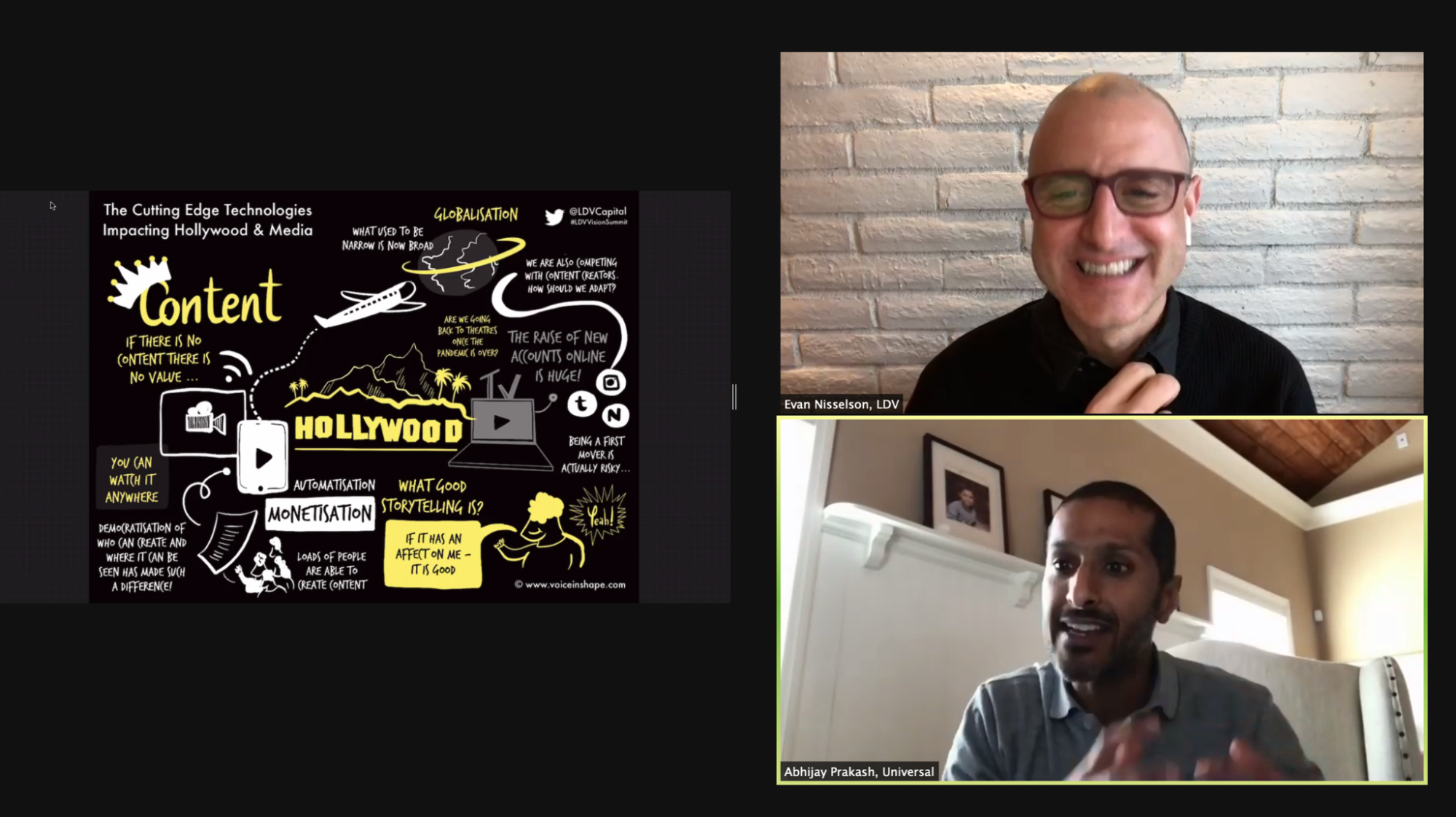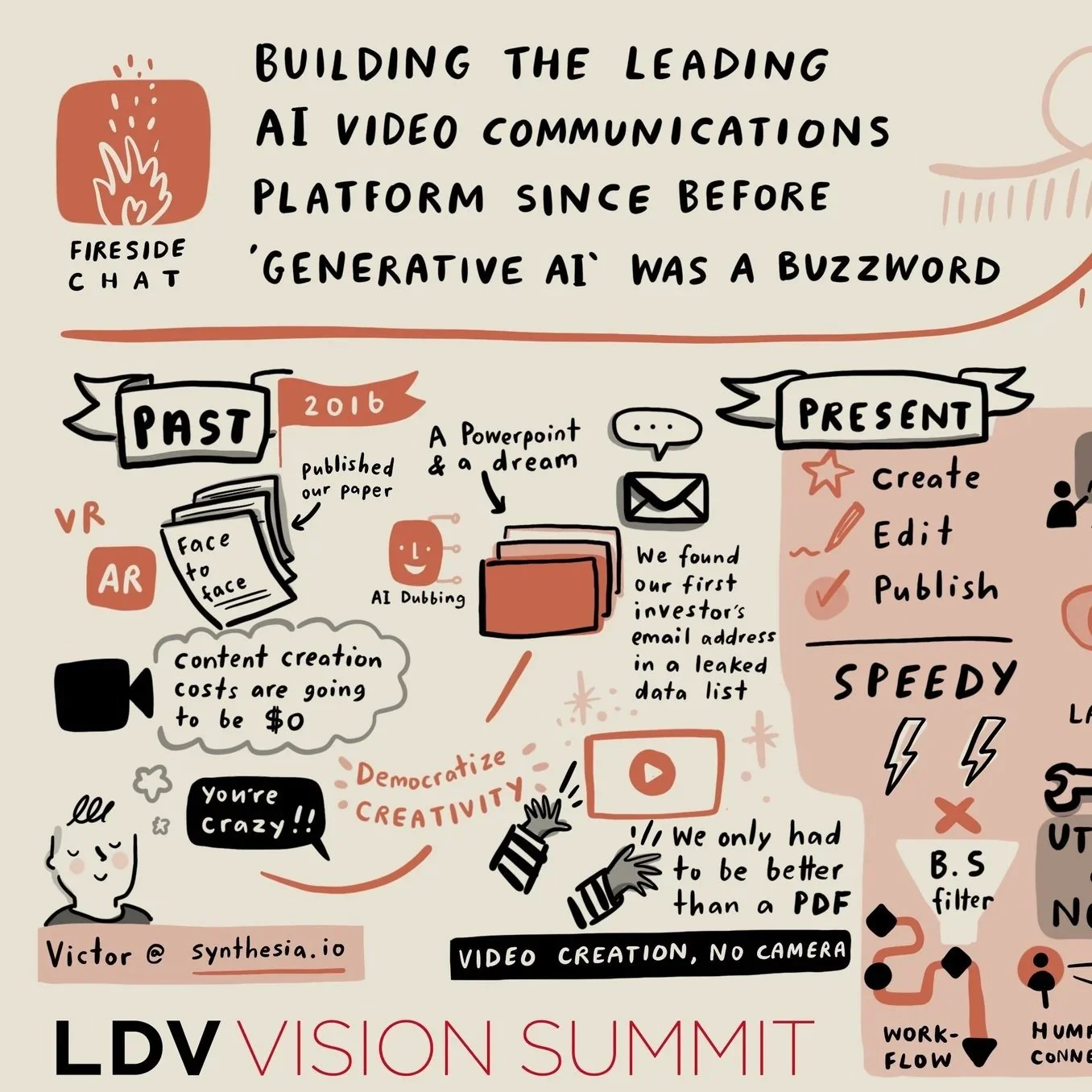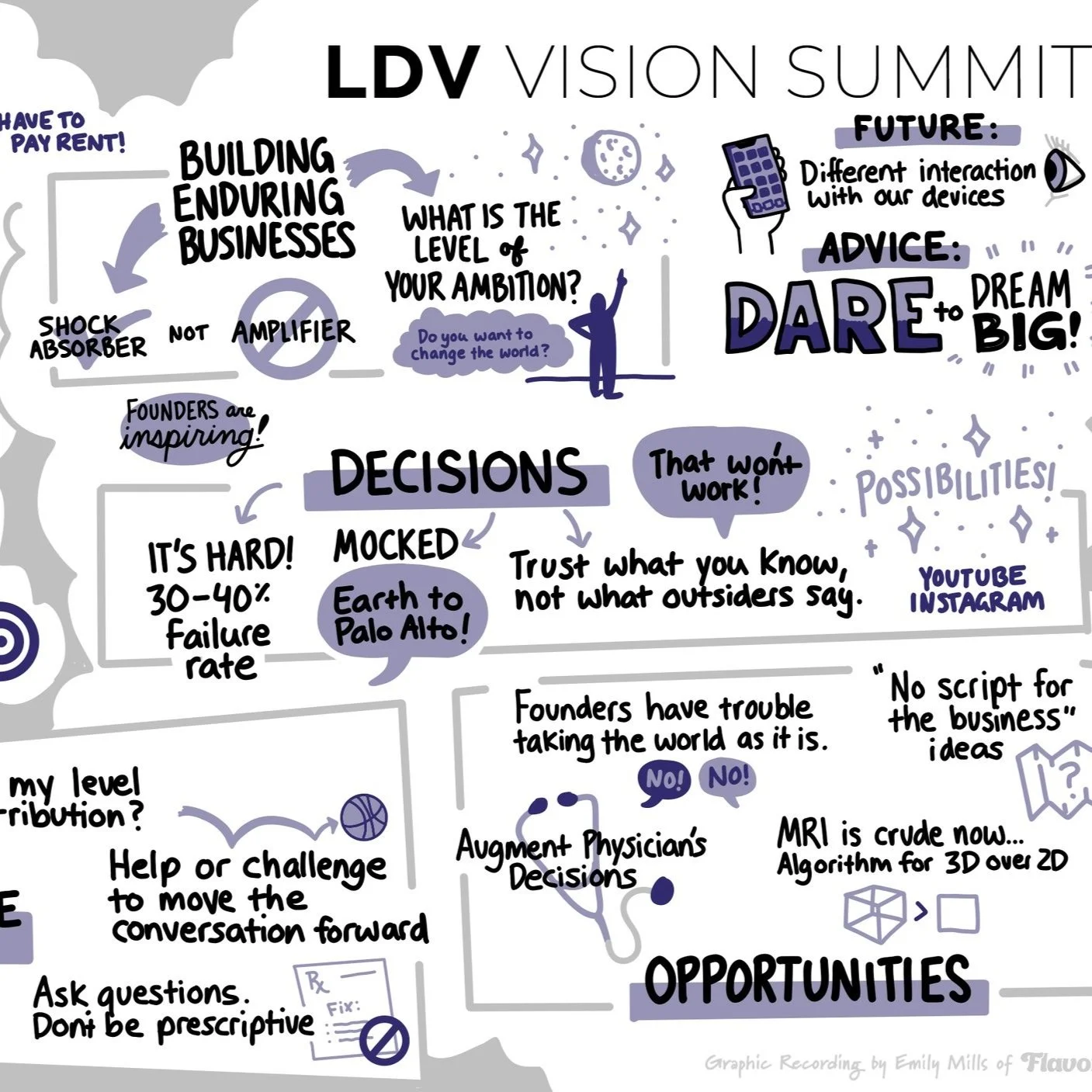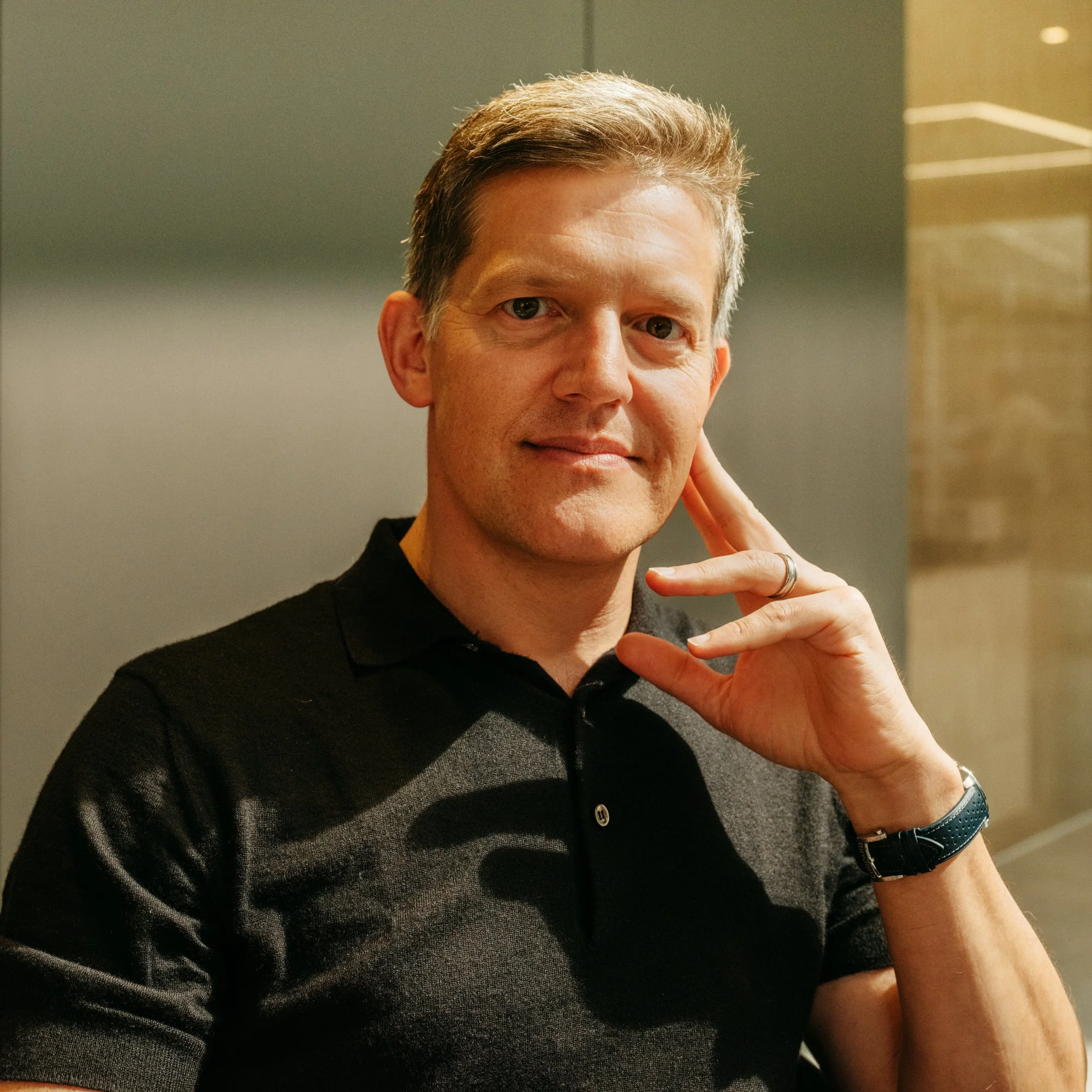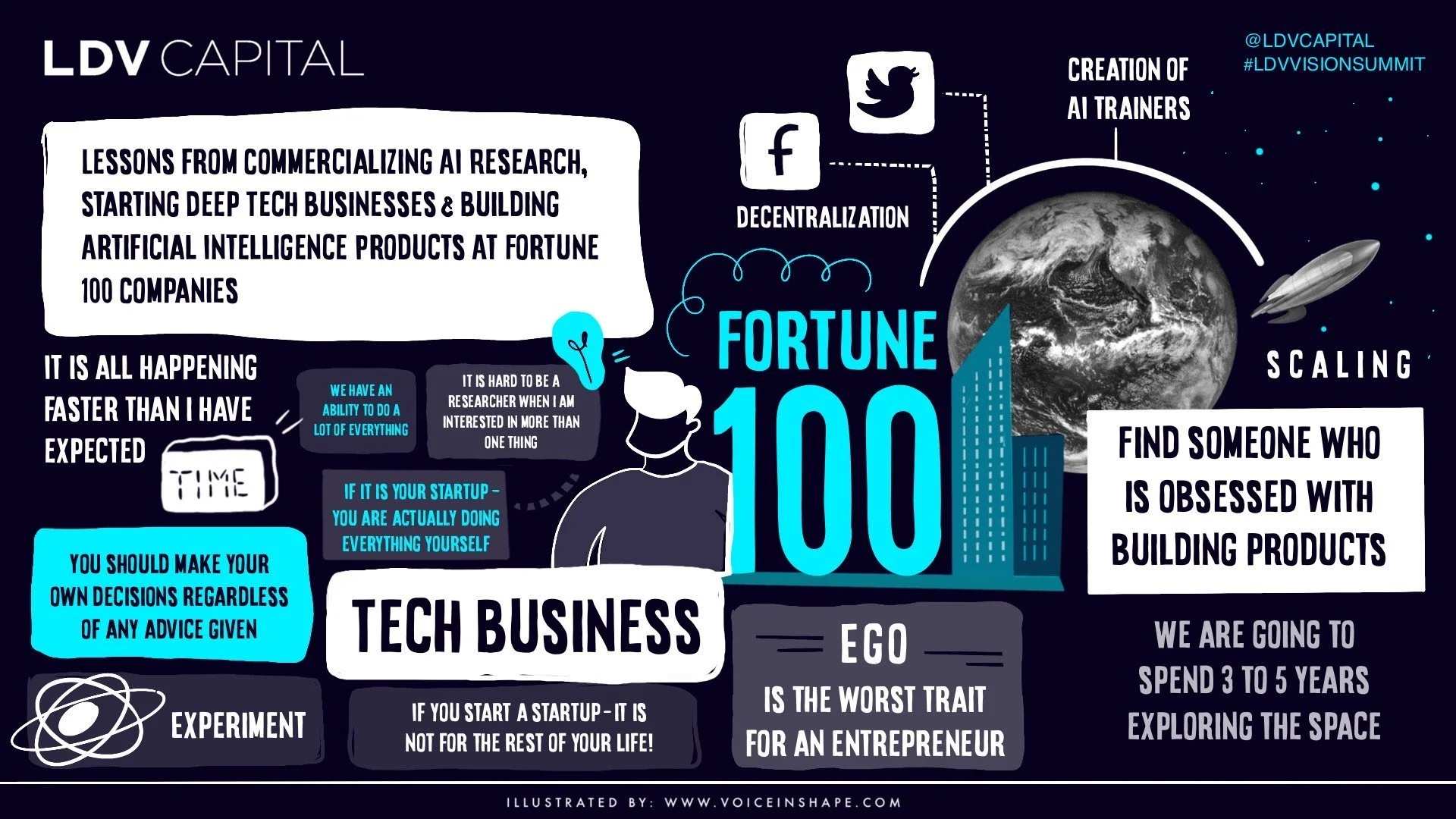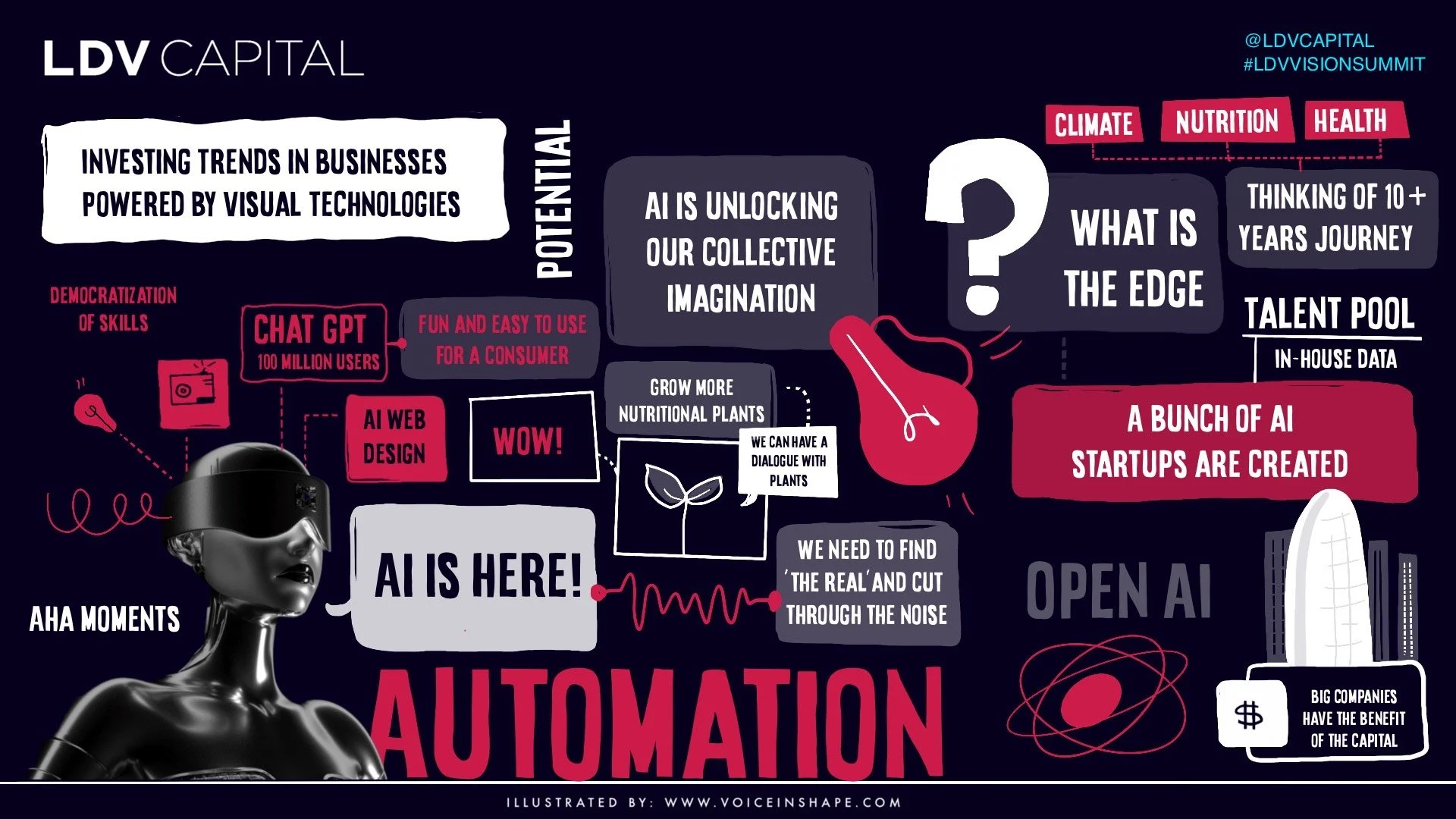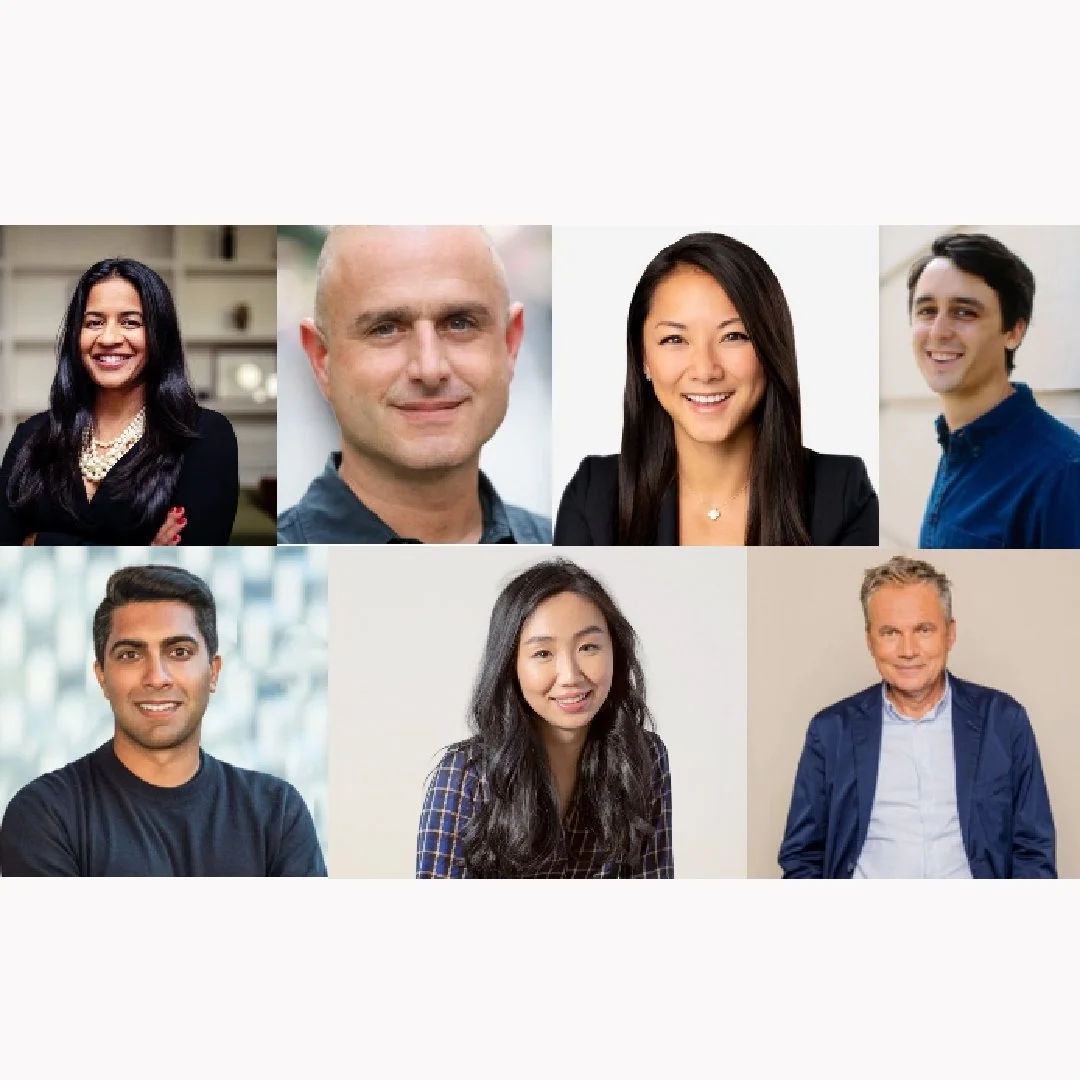The Cutting Edge Technologies Impacting Hollywood & the Media
/Interview with Abhijay Prakash, President of Universal Filmed Entertainment Group
LDV Capital invests in people building businesses powered by visual technologies. We thrive on collaborating with deep tech teams leveraging computer vision, machine learning, and artificial intelligence to analyze visual data. We are the only venture capital firm with this thesis.
In 2014, we started LDV Vision Summit, an annual event for entrepreneurs, researchers, investors, media executives, and creators. The goal was and still is to bring together our visual tech ecosystem and create a space where we can discuss what's happening today, and what, most importantly, will happen tomorrow.
Earlier this year, we hosted our 7th annual LDV Vision Summit virtually and this allowed us to welcome hundreds of attendees from all over the world. We had a stellar lineup of speakers who covered synthetic content creation, computational healthcare, sensors and chips, food and agriculture, logistics and manufacturing, and so much more!
We had the pleasure to host a fireside chat between Abhijay Prakash, President of Universal Filmed Entertainment Group, and Evan Nisselson, LDV Capital’s Founder and General Partner. They discussed entertainment, Hollywood, and new technologies. If you missed our Summit, this is your chance to watch this interview.
Abhijay Prakash is a member of the Academy of Motion Picture Arts and Sciences. As President of Universal Filmed Entertainment Group, he's responsible for driving the studio's strategic and long-range planning while also overseeing the business operations.
Previously, he served as COO of DreamWorks Animation, COO of Focus Features, EVP of Universal Pictures. During his tenure at Universal, he served as a consultant at Boston Consulting Group and been in the media and entertainment division. He also held positions at IGN Entertainment and Artisan Entertainment, which became Lionsgate.
The following is the shortened text version of the interview.
Evan: There was some interview where you said that when you were a kid, you were obsessed with movies, television, sports, and entertainment, which probably is similar to many kids. What was your favorite show? What resonated with you back then that maybe has an impact somehow, directly or indirectly, with what you're doing today?
Abhijay: I watched everything so much that my parents had to come up with a chart that limited my TV hours for the week. I had to plan it out so that I stayed within the timeframe. There was so much to choose from. Miami Vice was probably the TV show that I would call out for a couple of reasons. One, it was cops and robbers and I was a young boy. Two, it was aspirational with the cars and the beaches and the lifestyle. Three, which I discovered later, the look of the show and its style was Michael Mann, this singular filmmaker that became, as I grew up, one of my favorite filmmakers. And then finally, there was an illicit aspect to it. I'd go to school and other kids would be like, "Wait, your dad lets you watch that show," and that made it cooler. That illicit aspect and that connection with my dad also helped.
When I got to Universal, I was fortunate to meet Michael Mann and tell him how much of an impression he made on me as a young child.
Evan: The next interesting thing which relates to our technology discussion today – you were about to go get a Ph.D. in economics but all of a sudden you decided to join a startup. How did you make that decision and why? Do you have any regrets about doing that?
Abhijay: I think I'd already enrolled in a Ph.D. program at the University of Michigan in economics when there was this siren call of all my friends taking jobs in the Bay Area where they're passing out signing bonuses and stock options to work on all kinds of dot-coms. I was like, "Well, you're only young once. Let me try." This is a very different lifestyle. I deferred for a year. I never went back and moved West. They paid for everything to come out and it was a media company too, which was always a thing of interest to me.
At the time, it was snowball.com, it had a free, ad-supported business model. It didn't pan out for everything and the only part that remained and survived was IGM which subsequently got bought by New Score. That gave me the taste that you could work in media and have analytics.
I wanted to work in media. It's collaborative. It touches on the creative and I got juiced by that. Then I discovered that that existed in the movie business which was the thing on the top of the hill that I'd aspire for. Much to my dad’s chagrin, that led me to the point that I turned down pre-IPO jobs at places like Google to come work at a movie studio.
Evan: What is the biggest technological advancement that has made the biggest impression on you since you started working in Hollywood?
Abhijay: What used to be narrow is now broad and I'd say it's happened in two dimensions. There is the democratization of the creation of content. You have Steven Soderbergh and folks making movies on iPhones and all these technologies are now at your fingertips.
The other one is the expansion of the platforms on which content is consumed. It used to be narrow too. It was a big screen in a movie theater or a TV screen at home. Now you've got phones and screens all over the place. Even what you can watch on an airplane has multiplied from what it used to be.
Evan: How do you define storytelling in a digital age? What is the definition of digital storytelling?
Abhijay: I tend to take a more expansive view. Some folks are traditionalists of a long-form but you can do storytelling in shorter formats as well.
It depends on your perspective but I think digital storytelling is anything that engages folks.
As a kid, I was always amazed that someone in some room, somewhere at the time, in Hollywood, could write something, put it out, and then it would go everywhere in the world.
©Voice in Shape
Evan: Years ago you could create content and distribute it everywhere and today, you can create content and distribute it everywhere but the definition of “everywhere” is exponentially further. You deliver it to every device, to every person, to every corner. It's probably going to go even further. Is technology a means to the end or is content king?
Abhijay: Working at a content company, I have a bias towards content. Like any of those formulations, it’s simplistic because the temptation is if something's king then everybody else is subject, and I don't think it works that way.
It's an ecosystem and content exists in the ecosystem because I wouldn't say that the distribution gatekeepers are without power, right? They play an important role, and it’s not just in terms of what content owners get paid but even what gets served up.
Look at the battle between Epic Games and Apple and Epic Games and Google. That's a content company and a gatekeeper and I think you'd be hard-pressed to say that the distribution gatekeepers in Apple and Google's case are without power and subject to Epic. Let's see how it plays out.
I think of our content as existing in its ecosystem.
It’s indisputable that if you have great content you have a business. In that sense, it is paramount and you don't have anything else without it. I spend a lot of time thinking about business models, but at the end of the day, if you don't have compelling content, I can drop the best business model on the white piece of paper, it won't matter.
Evan: Hollywood is about creating visual content, IP [intellectual property], franchises. It used to be more theaters rentals and now, it’s streaming and merchandising. What new channels are exciting you? What are you testing in your world that you can share with us and/or where are the exponential growth and new revenue opportunities?
Abhijay: It’s one of the reasons I'm at the LDV Vision Summit today, I want to learn more about it.
One of the things that we talk a lot about is thinking of ourselves as a content creation studio or content & IP studio so that we're not defined by just making movies that go in movie theaters.
You have to think of a more expansive view of what our business is. Defining yourself that way is important. The natural extension is already happening of course, which is you make movies but you don't make them necessarily just for theaters and they can go to streaming platforms and other places.
With platforms like TikTok, OnlyFans, Patreon, and all the creator economy, how can we tap into that with our IP and our talent? I don't know that we've figured that out yet but I'm fascinated by that. How can we bring Jurassic, Minions, Fast & Furious, Pitch Perfect into these different environments and platforms to get consumers to engage with them?
I look at the music business and understandably, it's a different format. Audiovisual is more sensory and dominates when you're consuming content and music can exist in a parallel or background way as an enhancement. I broadly look at what music has done in terms of getting to different platforms. TikTok is a great example. What's our version of that? Is that VR/AR? How do we get on to all the billions of phones around the world in a more penetrating way that's still compelling for the consumer? I don't know what those answers are. There are multiple examples. Maybe we'll talk about a few that we've tried, but that is the promise. That's what we're trying to figure out.
Evan: Before we get too far in, the pandemic has impacted us on many levels and health is most important, but it's drastically impacted how people consume content over the last 10 or 12 months. What was the biggest surprise to you as the trend was happening of people hibernating?
Recent data from Kantar finds that by the end of 2020 there were 233 million video streaming subscriptions in the US. At the start of 2020, households subscribed to an average of 3.1 SVOD services. By the end of the year, that average had risen to 3.5.
Abhijay: Adapting to everything has scrambled all of our plans. Everything that happened was new. We were almost in a crisis mode when it comes to our business. Of course, the priority, as you said, was safety. Then beyond that was how do we keep going, put one foot in front of the other, instead of just turning off all the lights and hibernating until this is over, which didn't seem like the right move? The biggest surprise to us, and I wouldn't say I was that surprised by it but some folks were, was how this pre-pandemic trend of consumption of content in the home was growing. The rapid growth of SVOD (Subscription Video On Demand) is the greatest example.
We could see it show up as we've watched our revenues go in digital, transactional, like VOD and EST, but also in streaming. Even our trailers, which used to be a good proxy for how much someone would consume, went through the roof because people were consuming at home.
There wasn't a lot of new content. The cultural space in which content landed got quieter. Sports and other things were shut down. The things that were out there had more oxygen around them. Folks were consuming so much at home that it grew.
Some people could've pieced that together that would have happened but the extent to which it did still surprised us. We spent a lot of time thinking about the new normal.
When folks can leave their home again, how much of these current consumption habits will stay, and how much revert back to the way things used to be?
Figuring out where that land is the important part of how we release movies and calibrate our business and even what types of content we make.
Evan: Since you're thinking so much about that, what's your hypothesis?
Abhijay: I think the trends in 2019 were already headed in one direction. You could look at things that we've been facing for a long time as a business. We've been able to keep the overall box stuff healthy with growth in ticket prices but the per capita movie-going has been declining for a while. I think people are going to go to the theaters again but maybe not quite to the levels that it was.
With the number of people that consume on iTunes and Amazon and other digital platforms, you can see the growth and new accounts spending money to consume content at home. I don't think that goes away.
Short-form content is here to stay. I don't have a better phrase for it but I mean these platforms where content is created and consumed, like I was alluding to earlier, whether that's TikTok, OnlyFans, Patreon, or something else. This puts more pressure, motivation, and urgency for us to figure out how we can make those relevant for our business.
I was reading about Harry Potter TikTok in the New York Times. People are spending hours putting themselves into scenes from Harry Potter. It takes about 10 hours to put yourself in a short scene. Warner Brothers didn't have anything to do with that. If there's such passion for the people that create it, as well as from those who consume it, how do we tap into that? What's our version of that? Can we give tools to make it easier for you to insert yourself in Dom's Charger and drive along in a ‘Fast and Furious’ scene, or interact with a Minion? Those are the things we're looking to crack and find the right technologies and the right platforms for that to be in front of consumers.
Evan: How do you test new opportunities, either virtual worlds or avatars? What have you tested? Share and a couple of insights into how entrepreneurs can work best with you to help everybody win.
Abhijay: When it comes to some of these new technologies and formats, usually the place that we end up touching it the first time is in marketing. There are a couple of reasons for that. One, in a typical year, we have 20-30 marketing campaigns we're launching for our slate across Universal, Focus, DreamWorks, and Illumination.
A lot of times we're putting new content out in the world and we're trying to reach audiences, particularly those harder to reach, digital millennial audiences. Our digital marketing department is the one that's probably most at the forefront of all those new technologies because they have to see where consumers are. The lift is usually not that much of a lift. You don't have to do some big, multi-year licensing deal.
You're like, "I got an asset. You have a platform. Let's construct a promotion. It'll run from this time to this time." We've done that a couple of times.
We had a movie called Freaky that came out last year, where we did a partnership with the company called Reface. It allowed you to insert your face on top of Vince Vaughn’s face, he is the villain of the movie. You could put yourself in the trailer doing all these silly things that Vince Vaughn was doing in the trailer. And that's just one example of us being able to try new technologies.
Evan: The Holy Grail of IP and content is to be able to allow people to put their heads on it with. Is it got to a time where everybody was willing to try it or was that beating your head against the wall to justify, "Hey, we got to at least... We should try this"? And others I'm sure were saying, "You can't do that to our content."
Abhijay: It takes the right combination of internal will and filmmaking partner. We have a great partner – Jason Blum, CEO of Blumhouse Productions. He is a force of nature but he's game for everything. When we were doing our premium video-on-demand model or Reface, he was in for it. Frankly, most of our filmmakers are in for it too because they want their content to be reaching different parts of the audience, including those that live on a lot of these new digital platforms.
I’d say that for the content owners, or us as the owner and our partners as the filmmakers the bar for experimenting and trying these new platforms is low. We are into it and trust us, we'll do it in a way that's fitting with the brand.
What is harder, and I think you're alluding to this, is setting up... It’s harder but it’s also more exciting to set up something that's a long-term commercial arrangement, a monetization opportunity for us where we're saying, "Not only was it just a one-time thing on this movie, we are now going to, I'll make it up, give all of our library of IP, license it to one platform and create a host of tools for self insert videos, and user-generated content where you can play with."
I know AI folks don't call it, "IP." They call it “data” so I'll call it data too. "You'll get my data and you can use it to create all kinds of stuff" – that's a bigger deal. Then you get all kinds of, "Okay, well, how's it going to be used? I want to make sure it's consistent with the style guide of the IP". That bar is higher when you get to a monetization opportunity but we're not shying away from it.
Evan: Earlier, we talked about four different categories of technologies. One is marketing for you. Another is production dubbing, post-production. Another is new radical ways to produce, and four is the new monetization opportunities. I think the last two are most interesting. We've got an investment in a company called Synthesia, which is AI video production. In short term, it’s a marketing tool and an e-learning platform, where you can write texts and create avatars... but what is your definition of “radically altered”? How do you define that? Some people say, "Their business is, oh, it has to be 10X or 50X faster, cheaper, or blah, blah, blah." But what's your definition to say, "Oh my God, that could radically alter?"
Abhijay: I'd take 2X in our business, Evan.
Evan: The context is important. You ask somebody, "What's a lot of money?" and every person will disagree with what a lot of money is on this audience of hundreds of people. You say "2X." Okay. 2X defined by what?
Abhijay: Previously, I've worked as a COO at DreamWorks. Coming from working in live-action, one of the things that were hard for me to get my head around is how long it takes to make an animated feature. It is a lengthy process. It's mostly a proprietary pipeline that you use but the technology for doing it is time-consuming animation. Then you go through this process of lighting and finishing.
Rendering also takes a long time. Using game engine technology to do animation and create content allows for real-time rendering. It’s the way that they do games as the name implies.
If you can make movies that way, not only could it dramatically reduce the time, maybe by 2X but it also allows for an entirely different process for the content creator, for the director, and for the folks overseeing animation to see what they're doing in real-time. It just changed the performance, try out things, and you could end up with a different piece of content as well.
When you have these advances, you can decide then as the producer and as the content creator, how you want to use it? Do I want to do what I was going to do before but I'm just going to do it faster or do I want to do it to explore and push the story and the creative in a different way? You can decide when you get the time back, what do I do with the time?
Even if it is a 2X thing, it doesn't necessarily mean the movie is going to cost half as much because it's half as much time. We just might choose to create things that we weren't able to create before or raise the bar on the content. That's just one example.
That’s extended now into the live-action world with things like Lion King and Mandalorian with the use of game engine technology there. We're just in the first or second inning with that stuff.
The other day, I saw Epic Games introduced their MetaHumans out into the world. You could see a path where those things become more and more a part of how we make content and that's going to be powerful but I think other technologies are coming. It's laborious to have a character get up and walk and do the animation. That takes a lot of work.
At DreamWorks, we're working on this, automating it, having a walk cycle where you hit a button and the character goes. I'm probably describing something pretty rudimentary but you get the idea. Having more and more of that built by AI so that those tools are more powerful will change the game of how we create content.
Evan: That makes a lot of sense and we're looking at a lot of early-stage startups in and around that space. In our portfolio, we have a company on the website development side – Uizard. You can draw a wireframe, take a picture, automatically create a working prototype, and export the code. That is in the design space but something similar could be done for storyboarding. When you said, "2X" for the production, when you're looking at new monetization streams, some big companies say, "Well, we can't do that unless we believe it's a 50 million, a hundred million, or a billion-dollar opportunity." How do you test these opportunities?
Abhijay: The bar for testing is not that high. It doesn't need to be a hundred million because there's not a lot of downsides, right? As long as you're protecting our IP and not devaluing the IP, if you put something out there and it doesn't work, that's okay as long as it doesn't cannibalize or diminish some other opportunity, which it wouldn't in this case, and as long as it doesn't damage the IP.
That's the mode that we're in right now with a lot of these new things, which we want to figure out. That's why it often starts with marketing and then we see, "Can we lean in further?" Ultimately though, to put resources behind it and productize it and get to that monetization place, every dollar counts. The things that generate in the hundreds of millions are going to get a full division associated with it and things that aren't will become a piece of what our licensing group does.
It's hard for studios to be first movers. There's not a lot of advantages to being a first-mover in our space. I know there is a technology space or if you're building a platform and even in other parts of the media business, there are advantages for it. Not really as an IP owner because in fact, it usually goes the other way, where there's a bit of a penalty or a tax you pay for being first, for not striking the most aggressive deal terms or for figuring it out or having some user do something you don't want them to do with your content. There are a lot of risks associated with it and usually, it's better to be second or third where you go, "Oh, Paramount did that with Transformers? Great. Now I get to show up with Jurassic and say, "I want the same deal, but I can skip the pitfalls that they encountered."
That is an overcome that we're trying to push through because there's value in being first in terms of setting things up so that there is a market for us and others to participate in but to be a first mover is risky and usually not that lucrative for film studios & IP owners. There's a lot of frustration with Hollywood being legacy players and not being innovation-oriented but it's important to understand that, with the way that we're oriented until a Brink's drop of cash pulls up at Warner Brothers or Disney, we're usually disinclined to do anything. Then when it does, you go up and say, "All right, drop one off at my house, too."
Evan: You mentioned earlier the democratization and the creator economy and tens of millions on YouTube, social media, TikTok, everywhere. Could that, over time, disintermediate Hollywood and become the de facto majority of high-end content created?
Abhijay: It's unlikely that it would completely displace that or that it would be as high value but I do think it's an important part of what's happened. If I go back to when I was watching Miami Vice to now, the world has become a lot more fragmented in terms of that expansion, both in terms of content creation and the platforms but also globalization and how connected we are.
The world has become more fragmented so you have some things that have allowed our content to travel more, which is the connected world. You have a tent-pole movie, it can reach corners of the world today that it wasn't able to reach as easily in the past. My family is from India and I remember it was almost a time lag of a year before things that I saw back in the US would show up there in movie theaters or on TV. That doesn't exist anymore.
Content can be scaled in that way. At the same time, there's so much more of it. There's so much more fragmentation. There's so much more local content or regional content that appeals to people. I see what's happening with, call it the creator economy as another version of that, where there's more and more content for people to consume. That raises the bar for all of us in terms of what we have to put out there to be compelling and it's also an opportunity where you go. This is a silly example but if people are consuming memes a lot, let's make sure our IP is part of those means. I know there are some great Minions memes out there.
Evan: In one sentence, what's the most important advice to help entrepreneurs succeed, which will then also help you find the best opportunities to test monetization production, etc?
Abhijay: Think of us as IP owners who are very protective of our IP assets and have that in your mind when you come to engage because we are very risk-averse when it comes to that IP.
Evan: What is the visual tech that you're most excited about that today probably seems like science fiction, but in 20 years will be a reality?
Abhijay: I think AI-powered tools for content creation are exciting. Even though we are risk-averse when it comes to our IP, we know we need to have it out there in the world in a broader way and we're leaning forward to figure that out.
If there's a chasm to cross to get our IP out in new and different ways, we're ready to cross it, and being able to use those tools to create new content and get to different consumers is a priority for us.
Evan: We could talk for another hour, we appreciate and are honored for you to join us. We look forward to finding collaboration opportunities for the audience and us and you, and hopefully, you reach those next targets of 2-3-4X evolution in production and revenue.
Abhijay: Thanks, Evan. If I get to a hundred times, you'll all get a little royalty for it. Appreciate it.
Hope you enjoyed this interview as much as we did. Stay tuned for other insightful sessions from our 7th LDV Vision Summit as well as other Vision events.



